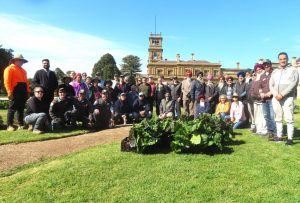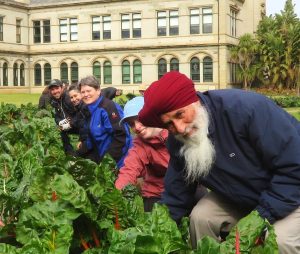Silverbeet project supporting vulnerable families
By Ruby Doan
Werribee Park has had another successful first harvest of its annual Silverbeet for Food Relief project.
The original purpose for planting Silverbeet in Werribee Park came from a need to rest and fertilise the soil, James Brincat, Parks Victoria Chief Ranger explains,
“It provides what’s called a green manure, which is when you use a previous crop dug into the soil basically reinvigorate the soil. So, it doesn’t just rest it, but it gives it another vibe. So that still happens with the bases of it, it’s the tops of it is what’s harvested,” he says.
 The operation has transformed in a lot of ways since its creation, evolving from a community demand for fresh vegetables during to the COVID-19 crisis to an annual process known as the “Silverbeet for Food Relief” project and a vital resource for locals.
The operation has transformed in a lot of ways since its creation, evolving from a community demand for fresh vegetables during to the COVID-19 crisis to an annual process known as the “Silverbeet for Food Relief” project and a vital resource for locals.
The Silverbeet is turned into free healthy food packs that are given to local vulnerable families.
When asked how the park’s mission and identity have evolved with the annual event, Mr Brincat says: “Heaps, in a word, absolutely heaps”.
“So, it has around 250 people across the community participating in some kind of way, whether it’s growing the plants from seed, the cultivation, the harvest, the dispersal,” he says.
Werribee Park is deeply embedded with local community and organisations. One of the project’s partners is Thee Coffee Table, which helps in both produce distribution and providing harvesters.
“They’re a support network for each other and for others in the community. They do everything from garden, to harvesting to cooking up,” Mr Brincat says.
The garden has transformed into a valuable community resource, providing fresh produce for Thee Coffee Table kitchen in Wyndham Vale, along with other establishments.
“The impact has been positive across a wider community, not just new and emerging communities but also mainstream communities,” Mr Brincat says.
The project has scaled from its first yield of 480 kilos to harvesting 3000 kilos of produce in 2025, made possible through the collaboration of a wide network of communities who tend to every step of the process.
 The process begins with the Sikh community’s sponsorship and local schools, such as the Australian College of Agriculture and Horticulture, pitching in with the germination of the seeds.
The process begins with the Sikh community’s sponsorship and local schools, such as the Australian College of Agriculture and Horticulture, pitching in with the germination of the seeds.
The partnership with the Sikh community began during COVID-19, organisers of the project were put in contact with Jasvinder Sidhu by the city of Wyndham, who organised the coordination and spurred the sponsorship into motion.
“He took a look at it and said look, there’s heaps of potential to help a lot of communities,” Mr Brincat says.
The project proves to be just that, with the first harvest providing 120 kilos of produce that was taken to the Tarneit Gurdwara, the Sikh place of worship, and given away in one day. This continues to this day, where food is transported to the Tarneit Gurdwara, cooked, and given away in the form of cooked or freshly packed meals.
“The project is going very strong, and every year it takes a new turn,” Mr Brincat says.
Weeding and growing, vital parts of the operation, is done by the Karen Aunties from Burma, who work together with the GenU all abilities gardening group to take care of the necessary growing and weeding.
When asked for a memorable interaction or occurrence from the community involvement, Mr. Brincat said: “It’s all pretty memorable, I think the one that really puts the smile on our faces is the GenU gardening group because they get so much happiness out of it”.
The project will continue in the long term, planting the same durable vegetable crop.
“Silverbeet is the easiest, the most rewarding, it does what we need it to do,” Mr Brincat says.
By providing fresh Silverbeet for the local community, Werribee Park establishes itself as not only a community resource but a social environment that strengthens connections and champions community service.












